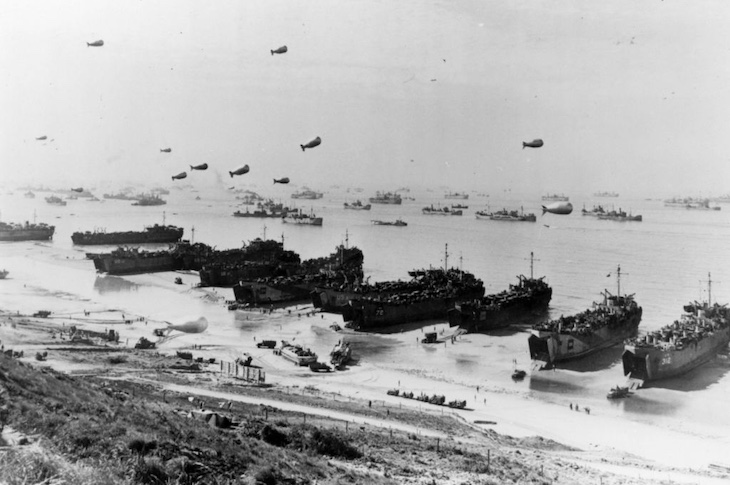Today we are commemorating the 80th anniversary of D-Day – ‘Operation OVERLORD’ – with fitting ceremony and reverence, though, some polls suggest, without much understanding. Some confusion in the public mind about the precise meaning and importance of the Normandy landings is surely understandable. D-Day itself, 6 June, however vital, was the culmination of a long process, and the beginning, not the end, of a bloody and grinding struggle. Historical anniversaries, especially a round figure such as 80, are a good opportunity for education, and school children and television viewers will certainly emerge more knowledgeable, and often moved and impressed after this week.
The scale of the 1944 invasion is unique in history
The scale and complexity of the invasion are even now astonishing, and it ought to deter any country – China, let us say – contemplating a major seaborne attack. Would any of the world’s armed forces today, or any alliance, be capable of the level of planning achieved in 1944? I doubt it. Could any country or coalition marshal the resources deployed on D-Day? It required the accumulated strength of two major industrial and military powers, Britain and America, built up over many months, and assembled from across the globe. The two great passenger liners, Queen Mary and Queen Elizabeth, had ferried thousands of American troops across the Atlantic faster than any U-Boat could catch.
The planning was the fruit of years of wartime experience. Fittingly, the principal naval planner, Admiral Bert Ramsay, had five years earlier organised the no less astonishing retreat from Dunkirk. He deserves our gratitude, and if he is sometimes forgotten, it is because he died in a plane accident in France only a few months later.
Nothing could be left to chance. The depth of water. The softness of sand. The location of German defences and troops. And the weather. The most important forecast in history was made by a Scottish meteorologist, Dr James Stagg, commissioned into the RAF. At a time of unsettled weather, he predicted an interval of sufficient calm on 6 June for the troops to land. The Germans predicted storms, so many senior officers left their posts, including the commander of the coastal defences, General Erwin Rommel, who went to Berlin for his wife’s birthday.
No less important was deceiving the Germans, who were made to believe that the Normandy landings were a feint, and that they should keep major forces ready for the ‘real’ invasion further north. Convincing them of this required not only watertight security, but the creation of a fake army in East Anglia supposedly poised to cross the Pas-de-Calais.
A multitude of people were involved at many levels. My favourite story – told to me by the former SAS officer and later Oxford historian M.R.D. Foot, who himself served in Normandy and narrowly escaped being murdered by the SS – was of two French schoolgirls who replaced the oil on a fleet of German tank transporters with abrasive fluid provided by the British, which wrecked the engines and kept a whole SS Panzer division well away from Normandy for a fortnight. According to Foot, they also sold the real oil on the black market. It’s too good not to be true.
Large cross-Channel invasions are understandably rare. Julius Caesar managed it, and even brought elephants. William of Orange came in 1688 with 500 ships and 20,000 men. Napoleon gave up in 1805 after building thousands of gunboats and landing craft. The scale of the 1944 invasion is unique in history. Over 140,000 men were landed (62,000 British, 57,000 American, 22,000 Canadian) by a fleet of 7,000 ships manned by over 100,000 Royal Navy personnel, plus Americans, Canadians, Norwegians, Poles, Dutch, French and Greeks. In support were 11,000 aircraft. For D-Day itself, 500 train loads of petrol were needed, and over the rest of June, 850,000 men and 500,000 tons of supplies were carried across the Channel.
Naturally and rightly, we remember the dangers and the sacrifices of those who lost life and limb on the Normandy beaches. Yet D-Day was a brilliant success with casualties lower than expected. Though the Americans met serious opposition on their two beaches, on the three British beaches casualties were remarkably light: on ‘Gold’ beach, the 50th Division suffered only 413 casualties. The bloody ordeal came in the weeks following, in the inland Battle of Normandy. D-Day, though vital, was the prelude to this decisive struggle.
It would be fitting, as we commemorate this anniversary, to remember the Battle for Normandy too, and the many lives it cost. Defeat there would have reversed the success of D-Day and been a disaster for the world. In a ten-week battle of attrition, British, Canadian and Polish units took on the main German forces, including seven of their ten armoured divisions, and the Americans broke out to the less defended south. The British army lost some 65,000 men – a proportion similar to the 1917 Battle of Passchendaele. The Germans, assailed by land and by waves of aircraft, lost more men in a shorter time than ever before, in a bloodbath equal to Stalingrad. Even Rommel’s car was shot up by a British or Canadian plane.
One of the many British casualties was a young tank commander who was also a poet, Keith Douglas. He had volunteered while a student at Oxford, fought in North Africa, and was killed south of Bayeux three days after D-Day. Waiting to go into action, he had written what could be his epitaph, and that of his comrades:
Actors waiting in the wings of Europe
we already watch the lights on the stage
and listen to the colossal overture begin…
Everyone, I suppose, will use these minutes
To look back, to hear music and recall
What we were doing and saying that year
During our last months as people, near
The sucking mouth of the day that swallowed us all …








Comments